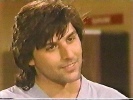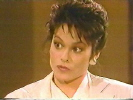|
Vincent
Irizarry
as Scott Clark in
Santa
Barbara
1987-1989
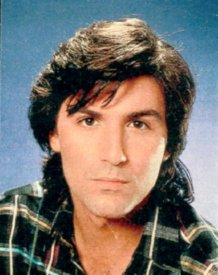
Review
of Scott on Santa Barbara
by DandEfan
Click
for larger picture
"Santa
Barbara" was known as one of the more quirky,
outrageously plotted soap operas. Yet, despite all of this,
Vincent's portrayal of Dr. Scott Clark rings consistently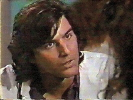 true. Vincent wears the character of Scott like a second skin and
all of the reactions that he has seem extraordinarily real. The
dialog never sounds forced or rehearsed, not ever. Whatever else I
accomplish here, I hope that I manage to convey some of the
brilliance I saw in Vincent's acting. Beautiful touches that he
brings to a scene, so characteristic in his portrayal as David on
AMC, are here as well. So who is this character? You'll see early
on in reading this that I haven't seen all of "Santa
Barbara," and in fact haven't seen all of Vincent's scenes,
much as I'd like to have. He brings a level of intensity to each
scene that is quite wonderful to watch--fire, gentleness, fury,
tears in his eyes in many scenes.
true. Vincent wears the character of Scott like a second skin and
all of the reactions that he has seem extraordinarily real. The
dialog never sounds forced or rehearsed, not ever. Whatever else I
accomplish here, I hope that I manage to convey some of the
brilliance I saw in Vincent's acting. Beautiful touches that he
brings to a scene, so characteristic in his portrayal as David on
AMC, are here as well. So who is this character? You'll see early
on in reading this that I haven't seen all of "Santa
Barbara," and in fact haven't seen all of Vincent's scenes,
much as I'd like to have. He brings a level of intensity to each
scene that is quite wonderful to watch--fire, gentleness, fury,
tears in his eyes in many scenes.
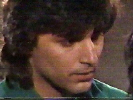 I've
been looking this pastiche of scenes featuring Scott as something
of a puzzle, working over the last while on figuring out how these
shadow people around him (aside from the love interests who are
prominently featured in the tape) fit into the overall Scott Clark
story. Some of what follows is conjecture, because I wasn't able
to glean it from the tapes or to find it on a "Santa
Barbara" site. Any information that follows that is
inaccurate I would welcome to hear about to correct later.
Meanwhile, if it's vague, it's because I just don't know but am
guessing. I've
been looking this pastiche of scenes featuring Scott as something
of a puzzle, working over the last while on figuring out how these
shadow people around him (aside from the love interests who are
prominently featured in the tape) fit into the overall Scott Clark
story. Some of what follows is conjecture, because I wasn't able
to glean it from the tapes or to find it on a "Santa
Barbara" site. Any information that follows that is
inaccurate I would welcome to hear about to correct later.
Meanwhile, if it's vague, it's because I just don't know but am
guessing.
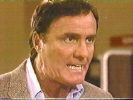 Scott
is the son of Ben Clark, an oil rigger, who works on the Capwell
oil wells. As far as I can tell, the Capwells are the main movers
and shakers in Santa Barbara, at least in soap Santa Barbara, with
C.C. Capwell at the helm, and most of the stories revolve around a
member of the Capwell family at one time or another. In fact,
Vincent's first Scott
is the son of Ben Clark, an oil rigger, who works on the Capwell
oil wells. As far as I can tell, the Capwells are the main movers
and shakers in Santa Barbara, at least in soap Santa Barbara, with
C.C. Capwell at the helm, and most of the stories revolve around a
member of the Capwell family at one time or another. In fact,
Vincent's first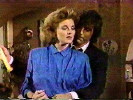 "leading lady" is an ex-Capwell by marriage--Gina (who
had been married to C.C.). She apparently has done outrageous
things to other people, but when Scott meets her she has just
recently become blind through an accident, and Scott is her
doctor. She's older than he is and feels extraordinarily
vulnerable because of this, and because of her blindness
"leading lady" is an ex-Capwell by marriage--Gina (who
had been married to C.C.). She apparently has done outrageous
things to other people, but when Scott meets her she has just
recently become blind through an accident, and Scott is her
doctor. She's older than he is and feels extraordinarily
vulnerable because of this, and because of her blindness 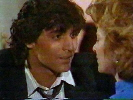 and
helplessness. Scott, meantime, a first year resident at the
hospital, treats her, helps her to cope with her blindness, and
they fall in love. He has refused to listen to nasty things about
her, feeling that he knows a different Gina from the one everyone
else is only too familiar with. They have some lovely scenes
together, but ultimately Gina's sight is starting to come back. At
Christmas, Scott touchingly says that the best present he could
give her is her sight back. Gina demurs on his giving her an eye
exam, and when he finally forces the issue a few weeks later, he
knows she's been able to see for weeks. He feels and
helplessness. Scott, meantime, a first year resident at the
hospital, treats her, helps her to cope with her blindness, and
they fall in love. He has refused to listen to nasty things about
her, feeling that he knows a different Gina from the one everyone
else is only too familiar with. They have some lovely scenes
together, but ultimately Gina's sight is starting to come back. At
Christmas, Scott touchingly says that the best present he could
give her is her sight back. Gina demurs on his giving her an eye
exam, and when he finally forces the issue a few weeks later, he
knows she's been able to see for weeks. He feels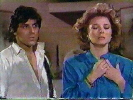 completely betrayed. Very different Scott here from the sweet
doctor of before. She tries to explain that she was terrified,
that if
completely betrayed. Very different Scott here from the sweet
doctor of before. She tries to explain that she was terrified,
that if 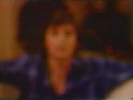 the
basic reason he fell in love with her is gone because she is no
longer blind and helpless, he wouldn't love her anymore. Scott
refuses to listen, screaming instead that she lied to him. "I
hate what you've done to us," he says. And that is the end of
Scott and Gina. the
basic reason he fell in love with her is gone because she is no
longer blind and helpless, he wouldn't love her anymore. Scott
refuses to listen, screaming instead that she lied to him. "I
hate what you've done to us," he says. And that is the end of
Scott and Gina.
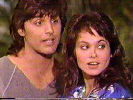 The
next love interest, Heather Donnelly, brings out an entirely
different dimension in Scott. Here, we have two doctors, both
residents, but she's a psychiatrist with a specialty in
hypnotherapy. Both are often exhausted from being on call for days
on end and tempers flare easily. Their story The
next love interest, Heather Donnelly, brings out an entirely
different dimension in Scott. Here, we have two doctors, both
residents, but she's a psychiatrist with a specialty in
hypnotherapy. Both are often exhausted from being on call for days
on end and tempers flare easily. Their story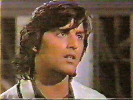 begins with a conflict over treatment of one of Scott's patients.
Heather wants to try hypnosis on young Josh to help him accept his
chemotherapy treatments. Scott pooh-poohs psychiatry and hypnosis,
calling it "hocus pocus
and mumbo jumbo." But later, after seeing the dramatic
difference in Josh for himself, he retracts his words and
apologizes.
begins with a conflict over treatment of one of Scott's patients.
Heather wants to try hypnosis on young Josh to help him accept his
chemotherapy treatments. Scott pooh-poohs psychiatry and hypnosis,
calling it "hocus pocus
and mumbo jumbo." But later, after seeing the dramatic
difference in Josh for himself, he retracts his words and
apologizes.
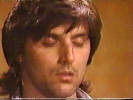 The
especially interesting part of the Scott/Heather relationship for me
is the unearthing of Scott's past that comes out over their time
together. By far the most powerful scenes are those where Heather
has hypnotized Scott, so that he can learn what happened the night
his Uncle Hal disappeared. Heather first takes him to age 16 and
Scott relives the night of his junior prom, meeting his date. His
face reflects a variety of emotions that he recounts--relief at
seeing Susie at the door rather than her mother, nervousness at the
thought of pinning the corsage on her and outright The
especially interesting part of the Scott/Heather relationship for me
is the unearthing of Scott's past that comes out over their time
together. By far the most powerful scenes are those where Heather
has hypnotized Scott, so that he can learn what happened the night
his Uncle Hal disappeared. Heather first takes him to age 16 and
Scott relives the night of his junior prom, meeting his date. His
face reflects a variety of emotions that he recounts--relief at
seeing Susie at the door rather than her mother, nervousness at the
thought of pinning the corsage on her and outright 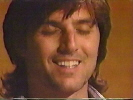 horror
at discovering that her dress had no straps. Then, Heather horror
at discovering that her dress had no straps. Then, Heather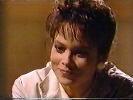 takes him back to age 5, and the night of his Uncle Hal's
disappearance. Instantly, Vincent is a 5-year old. "I'm in my
Uncle Hal's nice big car," he says grinning. He's hiding from
his uncle, but the car is in an accident and Scott hits his head.
His uncle orders Scott to stay in the car and leaves. It's a very
stormy night, the car windows are foggy and Scott becomes more and
more frightened.
takes him back to age 5, and the night of his Uncle Hal's
disappearance. Instantly, Vincent is a 5-year old. "I'm in my
Uncle Hal's nice big car," he says grinning. He's hiding from
his uncle, but the car is in an accident and Scott hits his head.
His uncle orders Scott to stay in the car and leaves. It's a very
stormy night, the car windows are foggy and Scott becomes more and
more frightened.
"I
don't like the lightning," he cries, and he disobeys and goes
out into the storm. He sees a light and runs toward it--the
boathouse. Then he's hiding. Scott
sees 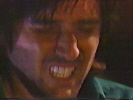 someone
fighting with his uncle and witnesses his uncle falling to the
floor. He tries to help his uncle, then scurries back into hiding as
someone returns to the room. He sees "a lady in a big
dress" find a gun and shoot his uncle. Vincent's acting is a
tour de force here. Every emotion this little boy is feeling is
palpable. His chest is heaving, he's screaming, "I don't know
what to do, I don't know what to do." Electrifying scenes! someone
fighting with his uncle and witnesses his uncle falling to the
floor. He tries to help his uncle, then scurries back into hiding as
someone returns to the room. He sees "a lady in a big
dress" find a gun and shoot his uncle. Vincent's acting is a
tour de force here. Every emotion this little boy is feeling is
palpable. His chest is heaving, he's screaming, "I don't know
what to do, I don't know what to do." Electrifying scenes!
Through
Heather, we also learn that his mother sold herself to get more
money for the family. This comes out in a scene at Christmastime.
Scott, feeling hemmed in by the 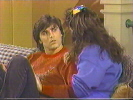 snow
and not wanting to talk to Heather about what is bothering him, goes
out for a snow
and not wanting to talk to Heather about what is bothering him, goes
out for a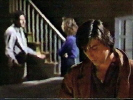 walk. There, he meets himself as an embittered, alone old man in a
take on "It's a Wonderful Life." He comes back inside and
unburdens himself to Heather, explaining that his father threw his
mother out after he discovered that she was selling herself for
extra spending money. He'd been begging for a new bike that year,
and got it, but also knew the cost. "I hated that bike,"
he says. Even more gripping, though, is a really moving
walk. There, he meets himself as an embittered, alone old man in a
take on "It's a Wonderful Life." He comes back inside and
unburdens himself to Heather, explaining that his father threw his
mother out after he discovered that she was selling herself for
extra spending money. He'd been begging for a new bike that year,
and got it, but also knew the cost. "I hated that bike,"
he says. Even more gripping, though, is a really moving 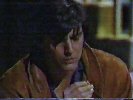 scene,
where Scott goes back to the house that he grew up in. Here, adult
Scott is walking around furniture covered over with sheets, watching
himself as a child. He goes to the piano and sees himself
reluctantly practicing with his mother sitting next to him, fiercely
telling him that the piano is one of the things that makes him
special. "No matter what it takes, you're going to have your
chance," she says. The culmination is a scene where young Scott
is sitting on the stairs at Christmas time and sees the furious
argument that leads to his mother being thrown out of the house.
Scott looks at his scene,
where Scott goes back to the house that he grew up in. Here, adult
Scott is walking around furniture covered over with sheets, watching
himself as a child. He goes to the piano and sees himself
reluctantly practicing with his mother sitting next to him, fiercely
telling him that the piano is one of the things that makes him
special. "No matter what it takes, you're going to have your
chance," she says. The culmination is a scene where young Scott
is sitting on the stairs at Christmas time and sees the furious
argument that leads to his mother being thrown out of the house.
Scott looks at his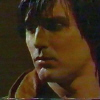 younger self and yells, "Why didn't you run and hide your head
in the pillows? Go on, run!" Then he addresses his parents with
tears in his eyes. "Didn't you know that I heard the whole
thing? Didn't you know what a fight like this does to a little boy?
How do you think it feels to hear your father call your mother a
whore?"
younger self and yells, "Why didn't you run and hide your head
in the pillows? Go on, run!" Then he addresses his parents with
tears in his eyes. "Didn't you know that I heard the whole
thing? Didn't you know what a fight like this does to a little boy?
How do you think it feels to hear your father call your mother a
whore?"
GO
TO PAGE 2
Index
for Before David
Home
to The Vincent Irizarry Website

This site is the
official Vincent Irizarry website and is for entertainment only.
Use of video captures by permission only.
Many thanks
to:
ABC Television
NBC Television
CBS Television
Soap Opera Digest
Soap Opera Weekly
ABC Soaps in Depth
Soap Opera Update
for carrying
stories and pictures of Vincent Irizarry
in the many roles he has played throughout the years.
Most importantly, I would like to thank Vincent Irizarry
for giving us hours of entertainment. |










